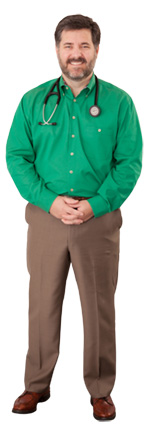 Medical Director, Riverside/Williamsburg Neurology and Sleep Disorders Center
Medical Director, Riverside/Williamsburg Neurology and Sleep Disorders Center
Medical Director, Riverside/Gloucester Neurology and Sleep Disorders Center
Growing up in Italy, a self-styled “military brat,” Patrick Harding saw the practice of medicine up close – but not in a hospital or doctor’s office. Rather, every year during the period of Ferragosto, the annual Italian August holiday, his entire family would visit his grandmother’s ancestral home, where his aunt would hold clinic every morning. “She was a pediatrician,” Dr. Harding remembers, “and everyone in the region knew she would be there. So they’d show up every morning with their children, and with their own ailments as well.”
They often had no money, so his aunt would accept bread or eggs – even once a bleating goat – as payment for her services. “She couldn’t turn anyone away,” Dr. Harding says. “I saw the effect she had on people, how she helped them, and that’s when I knew I wanted to become a doctor.”
By the time he was ready for medical school, his family had returned to Virginia, so he earned his undergraduate degree in biology from the College of William and Mary, and enrolled in EVMS. He graduated in 1993, and remained to complete his internship in internal medicine in 1994, followed by a residency in neurology (as Chief Resident in 1997.)
He had initially planned to become a cardiologist, but found neurology more compelling. During his residency, he was fortunate to be mentored by the late, much respected Dr. Tom Pellegrino, who suggested he consider changing his focus. “He said he thought I’d be a good fit in neurology,” Dr. Harding says. “It was definitely the right decision.”
While he was doing rotations in neurology, he took a sleep medicine elective, and found it fascinating – so much that he did six months of rotations, and needed just six more to sit for the Board exam. “At that time, you could be Board certified if you did the equivalency of one year’s worth of fellowship training,” he explains. He was again fortunate to have a supportive mentor, Dr. Tom Bond, who was then working with EVMS Medical Group. “Dr. Bond had been assigned to the Williamsburg area,” Dr. Harding recalls, “so when I moved to Williamsburg in 1997, I asked if he’d be my sponsor, and help me get the extra six months I needed.” Dr. Bond agreed, and a few years later, Dr. Harding sat for the Board – passing on his first attempt. Today, he is the Medical Director of the Riverside Neurology and Sleep Disorders Center sleep lab, practicing with three other physicians and a PA.
Sleep medicine is particularly gratifying to Dr. Harding, he says, because neurologists see many patients with neurological problems that can be managed, but not cured. “We can help them live better lives, but we can’t totally eliminate their disease. That can be frustrating,” he says, “but in sleep medicine, there are treatments we can offer that can actually reduce or even eliminate the problem, by educating patients and helping them improve their sleep habits.”
Some patients don’t – or can’t – believe they have a problem, he says. “I don’t know how many times I’ve heard patients say they don’t snore, or they don’t have apnea, or they don’t fall asleep at odd times.” One such patient was his father. “We were watching the Super Bowl together,” he says, “and my dad just fell right asleep during the game. I nudged him awake and asked him if it happened often and he denied it, just as so many other patients do when they don’t realize it.” He got his father into the sleep lab, discovered very significant apnea, and was able to cure it almost immediately. It’s a scenario that’s played out hundreds of times during his practice.
Dr. Harding also treats patients with more serious problems, like nocturnal seizures, a rare condition that patients are often unaware of until they wake up having bitten their tongue, lost bladder control, or even shrieking violently. “I probably see that more because I’m a neurologist,” he says, “as well as the narcolepsies, insomnias and leg movement disorders. Most sleep disorders have a neurological basis.”
In addition to caring for patients, Dr. Harding has been active in expanding the availability of sleep medicine to the residents of the Virginia Peninsula. From 1997 to 1999, he assisted in the creation and development of the Williamsburg Sleep Disorders Center at Williamsburg Community Hospital, in the City of Williamsburg, and served as its Medical Director for several years thereafter.
From 1999 to 2006, he assisted in the creation and development of the Williamsburg Neurology and Sleep Disorders Center, again acting as its Medical Director. He also assisted in the creation and development of the Williamsburg Neurology Infusion Center from 2004-2006; and since 2006, he has assisted in the creation and development of the Riverside Gloucester Neurology and Sleep Disorders Center, and has served as its Medical Director.
“Sleep is a reflection of your day, and ultimately reflects on your life,” Dr. Harding emphasizes to his patients. “People need to respect their sleep cycles. We’re living in a fast paced ever-changing world where everyone’s “plugged in;” we’re living on less and less sleep, and it’s affecting our wellbeing and longevity. I’m asked frequently why do we need sleep, and I explain that sleep is vital to the restoration and maintenance of normal brain function. Ultimately, sleep is when we take out the trash in order to get a fresh start to each day.”

